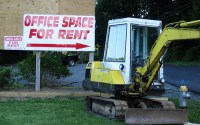January 13, 2014
Reel Property: Hitchcock’s Skin Game
A working-class family is wrongfully evicted from their rental homes and may lose their jobs. A neighboring landowner and his shrewd agent try to stop the sharp-dealing landlord from destroying property values with industrial air pollution. Can they successfully escalate conflict without unintended fallout?
This is the subject of Alfred Hitchcock’s early film, “The Skin Game” (1931). The Skin Game is based on a play by John Galsworthy, a British lawyer who found a second career as a writer. Mr. Hillcrist (C.V. France) is an old-money landowner at odds with Mr. Hornblower (Edmund Gwenn), a nouveau-riche industrialist. Hillcrist objects to Hornblower’s purchase of neighboring pristine countryside for the construction of new smoke-belching factories. The two battle over competing visions for the Deepwater community in a series of increasingly sharp business practices. The Hillcrests’ agent, Mr. Dawker (Edward Chapman) plays an easily overlooked role in this dark comedy.
Jocelyn Codner observes in her blog, The Hitchcock Haul, that The Skin Game speaks to contemporary controversies surrounding land use, fracking and class warfare. Contemporary audiences may identify with the film in additional ways. The Skin Game’s audience remembers the horrors of global war. Worldwide recession brought high unemployment. Fear and desperation hide in the film’s shadowy scenes. These emotions unfold in total war between the neighboring landowners with tragic, unintended consequences. Tenants’ and neighbors’ rights versus job creation.
The aggressive business practices in the movie are frequent, rash and ill-considered. I found myself counting all of the legal claims and defenses that could potentially be brought in Court (this post makes no effort to interpret the facts under 1931 British law). Spoilers follow, but they are 83 years in the making!
- Violation of Covenants. In order to build new factories, Mr. Hornblower violated a covenant he made to Hillcrist when he turned out long-standing residential tenants. In Virginia, that would likely unfold as a contested unlawful detainer (eviction) action. Since the parties did not end up in Court, I assume that the Hillcrists failed to make the covenant legally enforceable.
- Bid Rigging. A mutually coveted parcel of land goes to a public auction. Ominously, the auction house’s lawyer reads the conditions of sale so softly that only the front row can hear. The Hornblowers and Hillcrists bid in concert with their own secret bidding agents to confuse their opponent and hike the price. Hornblower wins. Hitchcock uses quick camera work and multiple angles to build suspense and simulate confusion.
- Fraud. Hornblower’s daughter-in-law Chloe (Phyllis Konstam) has a secret past that includes employment by men to help them secure divorces premised upon adultery. This doesn’t come up much in the era of non-fault divorce, but giving false testimony for hire is sanctionable.
- Conspiracy. The Hillcrists’ estate agent, Mr. Dawker discovers Chloe’s past from her former client. Mrs. Hillcrist and Mr. Dawker decide to use the secret to extort Mr. Hornblower into selling them the contested parcel at a loss. The parties anticipated that disclosure of the secret would destroy Chloe’s marriage with the young Hornblower. The consideration of a sale from Hornblower to Hillcrist consisted of both (a) a written contract for cash and (b) a secret unwritten agreement not to reveal Chloe’s past.
- Breach of Contract: Upon pressure by the young Hornblower, Mr. Dawker violates the secret unwritten non-disclosure agreement and likely his fiduciary duties to the Hillcrists.
- Professionalism. In contemporary transactions, one would expect Mr. Dawker to be a licensed real estate agent. His role in the bid rigging and the conspiracy would potentially expose him to disciplinary action by the Real Estate Board.
- Assault. In a fit of rage, Mr. Hornblower throws his hands on Mr. Hillcrist’s neck.
- Defense of Unclean Hands: Although the evicted tenants temporarily get their cottage back, this victory falls flat because of the greater tragedy which brings Mr. Hillcrist remorse. Unclean hands foul the initial nobility of their cause.
Was there a moment when a more trusted advisor, be it a realtor, attorney, or friend, could have helped Hillcrest settle the dispute? The loud passions of the warring families obscure Mr. Dawker’s fateful role as agent in the “Skin Game.” In the final scene, loggers chop down one of the Hillcrists’ oldest trees. What goes around, comes around.
January 2, 2014
Can My Landlord Evict My Business Without Going to Court First? – Part II – Complications to Landlord Self-Help
In Virginia, landlords have a right to evict commercial tenants without going to Court first. This does not make it likely or wise. Even in jurisdictions where self-help is legal, it is unusual to see landlords piling up their tenants’ business property on the curb. There are several reasons why:
1. Lease Terms: Any self-help must comply with the terms of the lease agreement. The laws of Virginia and its neighbors vary regarding a landlord’s remedies upon the tenant’s default. Many commercial leases are forms adapted from use in other jurisdictions. These forms may be a challenge to interpret under Virginia law. Even terms drafted with an eye to the law of the jurisdiction may not contemplate the exercise of the self-help remedies desired by the landlord’s agents. The terms of some lease agreements eliminate the right of self-help eviction entirely. Many other leases do not clearly define the landlord’s rights to exercise self-help. When parties negotiate the lease agreement, tenants typically request that any detailed landlord self-help eviction terms be edited out. The landlord often finds himself reserving, in a general way, its common law remedies, including self-help, without defining how they may be exercised. When the issue comes up upon default, both parties experience uncertainty regarding how a court would view the landlord’s threatened action.
2. Possibility of Property Damage: The landlord may be averse to taking possession of the property in a way that may damage the tenant’s property or involve physical confrontation with the tenant’s personnel. The landlord may desire an award or settlement for the balance of the lease. Property damage counterclaims complicate collection efforts.
3. Forcible Entry Claims: In certain situations landlords and tenants may be punished criminally under forcible entry, detainer or trespass for aggressive action taken with respect to the premises and business property in dispute.
4. Bankruptcy Stay: If the tenant is in bankruptcy, then an automatic stay likely prohibits self-help. The dispute between the landlord and the debtor-tenant over rights to possess the space is addressed in federal bankruptcy court.
5. Sublease: The landlord-tenant relationship may be complicated by a subletting arrangement. A sub-landlord and the master-landlord may disagree regarding their respective rights to possess the sub-leasehold. Disagreements between the property manager and the sub-landlord may delay action.
6. Institutional Landlords: The organizational structure of the landlord may play a role. When the same individual is the owner and property manager of the building, that person will likely exercise broader discretion than in a more institutional context.
These issues do not necessarily preclude the use of self-help. A risk-adverse landlord may view going to court to gain possession as a desirable alternative.
What should a tenant do if the landlord is threatening to take possession prior to going to court? The simplest options are to (a) avoid falling into default or (b) plan a move-out in advance if a default appears imminent. In certain situations, the circumstances of the business or relationship with the landlord may be too complex or attenuated for that. The tenant may have business operations or valuable property to protect. In any case, careful consideration of the lease terms and cogent communication with the landlord are essential. Where property and income are at stake, potential risks associated with changing locks and removing property are too great for either side to view landlord self-help as the logical first step towards resolving a dispute. In these situations, a tenant is best served by interacting with the landlord through experienced brokers and lawyers.
photo credit: vasilennka via photopin cc
December 31, 2013
Can My Landlord Evict My Business Without Going to Court First? – Part I
Part I – Landlord Self Help in Virginia
Suppose a company leases commercial property to run its business. Due to economic conditions, the tenant struggles to pay rent. The landlord has declared the tenant in default, or is threatening to do so. One of the remedies asserted by the landlord is “self-help” such as changing the locks and removing the business’ property from the premises. Can the landlord do that? What strategies and considerations are available to the tenant in such a situation?
When a tenant of a commercial property falls into default under the lease, or such default is imminent, knowing what options the landlord has moving forward is essential. The tenant making present use of the leased premises needs to know the landlord’s potential legal remedies so it can craft its own plan for the immediate future and to provide a framework for negotiations. In Virginia, and other jurisdictions where landlord self-help is permitted, threats such as changing the locks or otherwise barring the tenant from re-entry, removal of the property from the premises and placing it elsewhere may be the most urgent concern to a struggling commercial tenant. Understanding the respective rights of the landlord and tenant are crucial to planning continuity of business operations and safeguarding company property.
In Virginia, a landlord in a residential lease has no right of self-help eviction. However, the right of self-help remains an option for non-residential leaseholds. The commercial landlord is limited to using reasonable force in taking possession of the property upon default. The landlord may not “Breach the Peace” in taking possession. In other words, confrontation threatening physical harm is not permitted. Self-help may be attractive to the landlord in order to make an urgent transition to a new tenant without having to go to Court, take the case to trial and have the sheriff come out to the property.
While the remedy of self-help is legal in Virginia in non-residential matters, there are several considerations that make landlords reluctant to pursue it. In Part II, I will discuss several reasons why landlords usually avoid trying self-help eviction.
December 27, 2013
Client Relationships for the Custom Home Builder in 2014
In the past year or so, demand outpaced supply in the Northern Virginia real estate market. Many home builders and tradesmen went out of business in 2008-2009, creating a shortage of home builders. For home buyers, a custom home offers the prospect of owning a made-to-order dream home. For the builder, the custom home business brings rewards as well. These include the pricing of a premium product and working closely with buyers to help them fulfill their dreams. These dreams bear the legal complexity of contracting for the sale of something that does not yet exist. For the buyer, this is the biggest consumer purchase of their life. They rightly take pride of ownership in the project. This blog post identifies a few key issues from the perspective of the custom builder for the New Year:
- Liability Shield. You stand behind your work and want to keep your customers happy. This is how business grows. At the same time, you owe it to yourself and your family to protect your personal assets and credit. Customers expect that they will be doing business with a company. By incorporating or forming an LLC prior to making contracts, custom builders can exercise reasonable control of the exposure of their own credit and assets. Communications and agreements with customers should clarify the seller’s identity.
- Choosing the Customer. Prospective customers are likely talking to other builders or realtors. If a prospect reminds you too much of a previous problem customer, she may not be a good fit for your business. The wrong customer may distract you away from your more deserving customers and prospects. Consult with legal counsel if anti-discrimination or fair credit laws may apply.
- Written Agreements. Use an attorney-prepared written contract prepared for the particular type of project and state law. It may not be necessary to have a “new” form for each job. However, a realtor form for the sale of homes in Maryland won’t work well for a custom home in Virginia.
- Customer Service. Always have someone available to handle customer inquiries, at least during normal business hours. Buyers of custom homes tend to visit the site frequently and have questions. They feel a tremendous amount of financial and emotional investment in the project.
- Project Control. Don’t allow the consumer to directly supervise your subcontractors on the job site. An excited buyer may want to go outside his contract with you and hire his own tradesman to install items on property they don’t yet own. No car dealer would allow a shopper to take an auto to a body shop for a custom paint job during an extended test drive. The custom home builders do themselves and the customer a favor by anointing a manager or site supervisor to “face” with the client.
- Happy Endings. Take walk through inspections, punch lists and closings as an opportunity to communicate with the buyer and wrap things up effectively.
Home builders unfairly have a reputation for being unresponsive or inflexible with their customers. More often, custom builders struggle with being too accommodating with the demands of buyers. Most of all, custom home buyers expect the builder to provide them with personal leadership and advice. Attention to the legal aspects of your customer relationships is a critical element of entrepreneurial creativity and leadership.
December 23, 2013
Navigating the Walk Through Part II – Inspection Contingencies in Real Estate Contracts
Check Your Contract for Your Inspection Rights & Duties:
Many real estate contracts impose a right or duty to inspect and approve the development of a property before going to closing. Many contracts for custom homes or commercial developments contemplate that the parties will walk through the property prior to consummating the purchase. If you have a right under a contract, failure to exercise that right may potentially waive a future claim for a defect that reasonable exercise of the right of inspection would have discovered.
If the contract provision discusses preparation of a punch-list or inspection report based upon the inspection, both parties are well advised to take notes (on old-fashioned pads of paper or discretely using the camera in your phone or tablet) for later use in negotiating the inspection report.
If the transaction involves loans, the bank will require an independent appraisal. A shrewd investor takes heed of a professional appraisal, but does not allow it to substitute for her own review. Appraisals usually focus on a comparative analysis of the property with other properties with similar general characteristics, and do not look at the property from the perspective of having to live or work in it on a long term basis.
Home Inspection Industry in Virginia:
Many real estate purchasers use hired professional inspectors to help spot issues during walk-throughs. Most contracts for purchase of a home advise buyers of the opportunity to seek out the counsel of various types of professionals that may aid the inspection process.
Note that in Virginia, a home inspector does not have to be board-certified to do business as one. Currently, the Commonwealth of Virginia provides home inspectors with the opportunity to certify themselves. Home inspectors not certified by the state are forbidden from holding themselves out as certified if they are not, but they may continue to lawfully market their services as a home inspector.
In the purchase of a residential property, a Virginia certified home inspector or an inspector who is a licensed Virginia contractor, is likely to possess the basic qualifications. Various professional organizations, such as the American Society of Home Inspectors, provide members with credentialing opportunities as well. Bear in mind that these professionals can only advise you of what you see and prepare a report. What actions to take based on this information is subject to negotiation between the buyer and seller.
Repair Addenda:
The home inspection process may result in a list of items that the seller agrees to fix by a certain date. When the seller informs the buyer that the repairs are complete, this shifts responsibility somewhat back to the buyer to confirm that the changes are acceptable. In the event of a dispute, the Court will likely ascribe weight to those contracts and lists signed off on by the parties.
Reality TV Home Buying vs. Preparing for a Real Future:
Today’s investors and professionals have greater access to information about real estate than ever before. Whether you are going to use the property for business, personal or public purposes, you don’t need years of specialized experience to know what to look for in a walk through – only you know what questions you need answered.
Your own goals will provide you with a starting point for preparing a walk-through checklist. The issues to focus on in the walk-through are different for each situation, but the important thing is to have a plan of what to look for based on the matters at issue. Furthermore, a walk-through will provide you with certainty and a firm basis for negotiating the outcomes desirable to your business. Your family will live with the visceral effect of entering the property every day. Make the most of your walk-through before you buy, sell or lease your investment.
December 19, 2013
Navigating the Walk Through – Part I
From the moment the first person piled up rocks or rough-hewn timber to distinguish his farmland from the neighbors’, real estate has been visually-oriented. In the business of real estate, the walk-through of the premises provides you with an eyes-wide-open basis for due diligence and negotiation in sales, leases and dispute resolution. In the age of internet videos, Smartphone photography, Google maps, engineer drawings and online public land records, it is possible to learn much about a property without actually visiting it. However, real estate professionals still swear to the value of a real walk-through when your property is going through a transition. A photograph or video recording of a property may identify a desirable asset or potential problem without the time consuming task of driving to a location and talking a look. However, any kind of recording, photograph, drawing or description is at best a useful abstract of the property at a specific moment in time. If an entrepreneur desires to lease or purchase a property for purposes of operation of a unique business activity there, it is unlikely that a set of records could illustrate whether the property can fit her creative purpose. It is difficult to communicate with another party regarding a unique property concern without looking first.
Many buyers, tenants and lenders are drawn towards relying upon the representations of other people when entering into contracts. Business relationships do need trust in order to bear fruit. However, if someone insists that you make a decision without significant investigation, slow things down. The general rule in Virginia is caveat emptor –let the buyer beware. The law expects folks to be reasonably wary when it comes to entering into contracts. Further, once a party begins to conduct an investigation of matters underlying a contractual decision, the burden is on him or her to complete that investigation to the extent warranted by the situation. Of course, if the other party knowingly conceals a problem with real estate, the purchaser may have a basis to void the contract. After the fact, the burden of proving any kind of deceit would fall on the party suffering the harm. Generally speaking, the law expects parties entering into real estate contracts to do so reasonably self-informed about the subject property and the terms of the contract itself.
Part II of this post will explore the inspection process in more detail.






